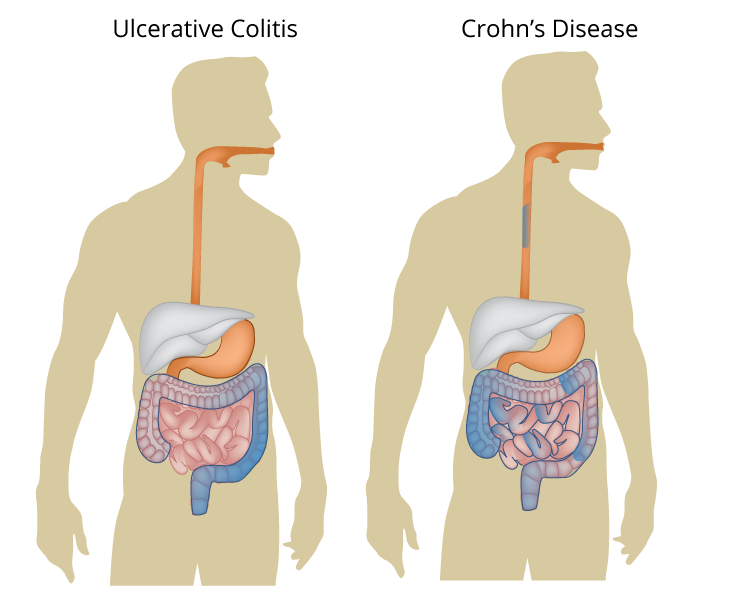Inflammatory Bowel Disease

Inflammatory Bowel Disease (IBD) is a comprehensive term describing diseases that are characterized by inflammation of some or all of the digestive tract. The two most common types of IBD are ulcerative colitis and Crohn’s disease. Both involve abdominal pain, diarrhea, fatigue and weight loss, and each is characterized by an abnormal reaction by the body’s immune system. Neither is an infection that can be passed to other people.
ULCERATIVE COLITIS
Ulcerative colitis is an inflammatory condition that affects the lining of the large intestine.
Symptoms
The severity of ulcerative colitis symptoms depends on the amount of colon that is affected and the degree to which the colon is inflamed.
- Persistent diarrhea, sometimes accompanied by blood or mucus
- Abdominal cramping or pain
- Urgent need to move bowels
- Feeling of incomplete evacuation after a bowel movement
- Fatigue
- Fever
- Loss of appetite or weight loss
Cause
Scientists are unsure of what causes ulcerative colitis, but have determined that a collection of factors may influence who contracts it. It is proposed that when a foreign substance enters the body, the immune system is triggered to respond but doesn’t turn off when the substance is gone causing the immune system to attack the lining of the colon.
Diagnosis
No single test can confirm whether you have UC. Your doctor will diagnose by:
- taking a medical history
- performing a physical exam
- performing diagnostic tests
Treatment
There is no cure for ulcerative colitis, and the treatment depends on the severity of symptoms that the patient experiences. The focus of a treatment plan is to
- Reduce inflammation
- Prevent symptom flare-up
- Maintain remission of symptoms
Keeping symptoms from flaring up improves the long-term prognosis by limiting complications. Your doctor will likely recommend
- Medications, such as mesalamine compounds, immune system suppressants, antibiotics, corticosteroids
- Dietary changes to minimize flare-ups
Some patients also may need
- Nutrition therapy
- Surgery
CROHN’S DISEASE
Crohn’s disease is an inflammatory condition that can affect any part of the gastrointestinal tract from the mouth to the anus, but most frequently affects the end of the small bowel and beginning of the colon.
Symptoms
Every patient experiences Crohn’s disease differently. The most common symptoms that characterize Crohn’s are
- Persistent diarrhea, sometimes accompanied by blood or mucus
- Abdominal cramping or pain
- Urgent need to move bowels
- Fatigue
- Fever
- Loss of appetite or weight loss
- Mouth sores
Cause
Doctors do not know the cause of Crohn’s disease, although genetics may play a role since it tends to run in families. Experts have concluded that Crohn’s may be caused by a heightened autoimmune reaction to bacteria present in the digestive tract.
Diagnosis
No single test can confirm whether you have CD. Your doctor will diagnose by:
- taking a medical history
- performing a physical exam
- performing diagnostic tests
Treatment
There is no cure for Crohn’s disease and no single treatment works for all patients. The focus of a treatment plan is to
- Reduce inflammation
- Prevent symptom flare-up
- Maintain remission of symptoms
Controlling and eliminating inflammation improves long-term prognosis. Your doctor will likely recommend
- Medications, such as mesalamine compounds, immune system suppressants, antibiotics, corticosteroids
- Dietary changes to minimize flare-ups
Some patients also may need
- Nutrition therapy
- Surgery
While the initial diagnosis of Crohn’s or ulcerative colitis can be overwhelming, most people are able to living a fulfilling and productive life. It is important to learn as much as possible about the condition, to partner with the medical team doctor to make a treatment plan, and to maintain a good support system with family, friends and others with IBD.
Resources:
http://www.crohnscolitisfoundation.org
http://patients.gi.org/topics/inflammatory-bowel-disease/
Ulcerative colitis: https://www.niddk.nih.gov/health-information/digestive-diseases/ulcerative-colitis
Crohn’s: https://www.niddk.nih.gov/health-information/digestive-diseases/crohns-disease
If you have been diagnosed or have symptoms that cause you to think you might have IBD, our office can help. Call (706) 868-0104 for more information.
The content on our website is for informational purposes only, and is not intended to diagnose or treat any medical conditions. Always seek the advice of your physician with any questions you may have regarding your health.
